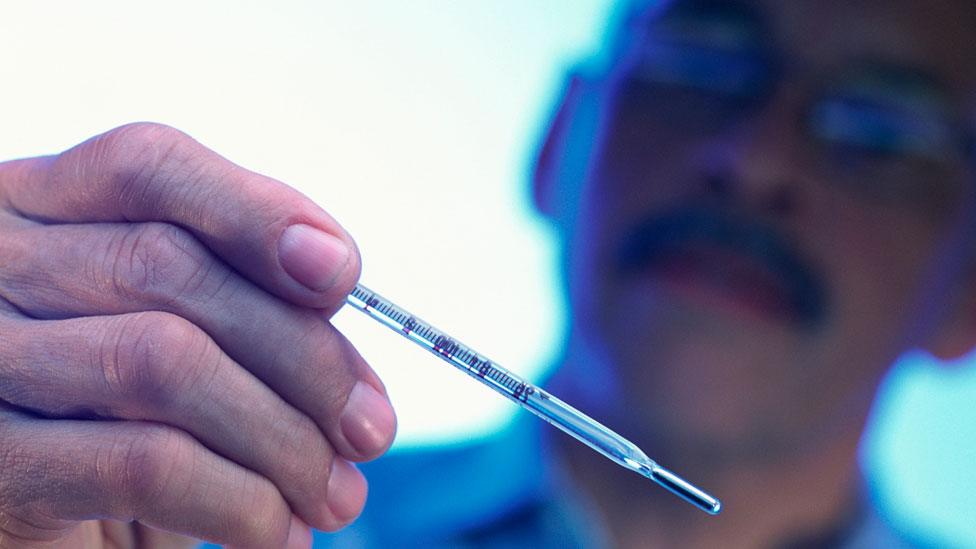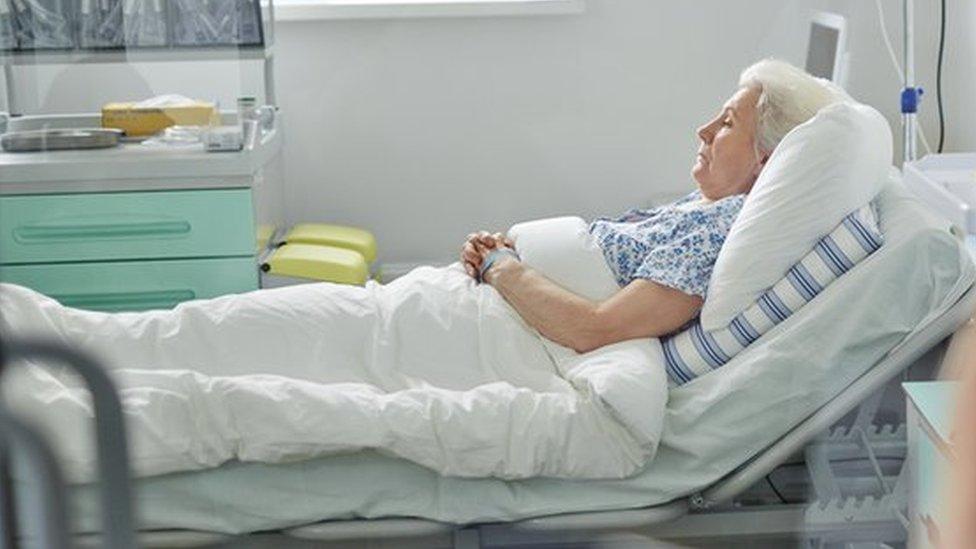Fewer beds, higher patient demand - NHS pressure mounts
- Published

With many hospitals close to full in these difficult winter weeks, there has been much debate about the resources available in the health service.
Patient demand is rising faster than the budget increases allocated to the NHS in England.
Yet the number of hospital bed numbers has fallen steadily in recent years. So what is going on?
The total number of overnight hospital beds in England fell from 144,455 at the start of the 2010/11 financial year to 129,458 in the middle of 2016 (the last recorded figures). The number of day beds over that period increased from 11,783 to 12,480.
Looking further back into history reveals a sharper rate of decline.
That current figure of overnight beds compares with almost 300,000 in 1987-88 according to figures from the Nuffield Trust.
There was a steep fall in the late 1980s and early 1990s, then a more static position between 2000 and 2005 and then a resumption of the downward curve.
The fall in bed numbers coincided with big changes in patterns of care.
Medical advances
Institutionalised mental health treatment gave way to more care in a patient's local community so fewer beds were needed.
Elderly care medicine changed too, with more older patients cared for closer to home.
Medical advances meant that more patients could be treated as day cases.
Average stays in hospitals for those needing overnight beds have fallen. There was a similar trend in other healthcare systems.
As bed numbers fell in England, occupancy rates did not shoot up. This suggests that the health service has been more efficient with its care and dealing with more cases outside hospitals.
Over the first three months of 2016 in England, 89% of beds were occupied on average compared to 86.6% over the same period in 2011.
But has the system reached a tipping point? Hospital bed occupancy rates have crept up to 95% in the first weeks of 2017.
Trust chiefs have reported days when they have been literally full with a new patient admitted only when one has been discharged.
Demographic change
Back in October 2014, a Nuffield Trust report, external noted that pressures were immense with demographic change and an ageing population the most significant drivers.
"Our analysis shows that if admission rates continue to rise, the NHS will need an additional 6.2m 'bed days' by 2022 - which equates to 22 hospitals with 800 beds each," it said.
Nuffield went on to say that building new hospitals was not the answer and that curbing demand had to be part of the solution along with more joined up health and social care to keep people out of hospital where possible.

Demand from older patients has risen
That was their prognosis in 2014. Two-and-a-half years on there have been no obvious signs of progress.
The drive for efficiency savings will continue but the calls for more investment in the NHS have become louder.
The Chief Inspector of Hospitals in England, Sir Mike Richards, told the BBC this week that he was "very concerned" about the degree of strain experienced by hospitals.
He continued by saying "I believe the government will need to put more money into the NHS" - though he added it was important the money was spent "wisely".
The budget watchdog the Office for Budget Responsibility (OBR) argued this week that it was inevitable that health spending would rise because of demographic factors and the advance of medical technology.
The OBR said health spending could rise, external from 6.9% of economic activity (GDP) in 2021 to 12.6% in 2066.
The watchdog noted this could put great strain on public finances unless governments raised taxes or cut spending elsewhere.
Ministers argue they have given the NHS in England above inflation increases in funding through till 2020.
They also say that progress is being made at local level in joining up health and social care.
But the demands for more money will continue, including from some on the Conservative benches in the Commons.
And questions will be asked about the wisdom of reducing bed numbers and whether that can be reversed.

Have you used NHS services in 2017? What was your experience? Email your comments to haveyoursay@bbc.co.uk, external
Or you can contact us in the following ways:
Twitter: @BBC_HaveYourSay, external
SMS/MMS: 61124 or if you are outside of the UK +44 7624 800 100
- Published19 January 2017
